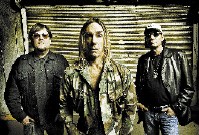Plain White T’s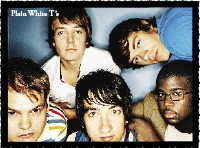
Cellular South Stage
6:10 p.m.
Since its formation a decade ago, Chicago emo-core group Plain White T’s have recorded three albums, participated in the 2005 Take Action Tour and the ’06 Warped Tour, and grown from a trio to a full-blown quintet, while lead singer Tom Higgenson has survived a devastating car wreck that nearly cost him a kidney. Last year, Plain White T’s cut their Hollywood Records debut, the hook-laden Every Second Counts, which features power-pop anthems such as “Our Time Now” and “Hate (I Really Don’t Like You),” served up with crunchy guitar chords courtesy of Tim Lopez and Dave Tirio, Mike Retondo’s rapid-fire bass work, and De’Mar Hamilton’s hammer-like beats. Expect to hear both hit songs in the group’s live set along with fan favorites such as “Hey There Delilah,” off the group’s sophomore effort, All That We Needed.
Sum 41
Cellular South Stage
7:40 p.m.
With a punk-meets-hip-hop style that harkens back to early-’80s Beastie Boys, Canadian rockers Sum 41 have made a career out of ridiculous antics, fifth-grade humor, and rousing punk-pop lyrics. Their fourth full-length, Chuck, was released three years ago, followed by a high-energy (and high-volume) live effort, Go Chuck Yourself, which came out in 2006. Frontman Deryck Whibley — who comes across as cartoonish as the Gorillaz at times — invites inevitable comparisons to Blink-182 vocalist Tom DeLonge, employing plenty of sarcasm and some explicit language to get the party started. Expect a mostly male crowd dominating a makeshift mosh pit in front of the stage, dancing and posturing to tunes such as “The Hell Song” and “We’re All To Blame.”
The Red Jumpsuit Apparatus
Cellular South Stage
9:15 p.m.
Florida quintet the Red Jumpsuit Apparatus have perfected the emo sound that dominates today’s alternative music scene. Frontman Ronnie Winter tackles domestic abuse on the song “Face Down,” the first single off their platinum-selling debut Don’t You Fake It, singing, “Do you feel like a man when you push her around?” Remove the thought-provoking lyrics of tunes such as “Your Guardian Angel” and “Cat and Mouse,” and you’ll hear elements of Jimmy Eat World and Hawthorne Heights — which is why the Red Jumpsuit Apparatus won over so many fans on the Warped Tour last summer. With their appearance at the Beale Street Music Fest, they’ll up the ante for likeminded modern-rock outfits with their hard-won insight, which, ironically, has taken them to the top of the Billboard charts.
Iggy & the Stooges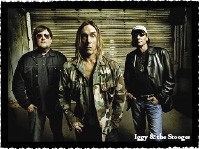
Cellular South Stage
10:55 p.m.
Iggy Pop, rock’s original bad boy, has rejoined guitarist Ron Asheton and drummer Scott Asheton (with Mike Watt filling in for the late Dave Alexander on bass) in the Stooges after a 30-year absence. Progenitors of the punk-rock and metal movements, the Detroit-based quartet made their reputation on hard-driving albums such as early-’70s classics Fun House and Raw Power as well as via Iggy’s oft-chronicled onstage antics, which included self-mutilation, crowd surfing, and chaos-inducing dance moves. Re-formed in 2003 to the joy of rock-and-roll nihilists everywhere, the Stooges have delivered stellar sets at music festivals ranging from England’s All Tomorrow’s Parties to Australia’s Big Day Out. Although the Stooges’ new studio album, The Weirdness, hasn’t earned the critical acclaim of its ’70s predecessors, the Stooges are sure to strike a chord with anthems such as “I Wanna Be Your Dog” and “Raw Power,” which have influenced countless other bands, including Guns N’ Roses, Sonic Youth, Nirvana, and Slayer.
The Derek Trucks Band
Budweiser Stage
6 p.m.
Derek Trucks, son of the Allman Brothers Band’s Butch Trucks, capably tosses off blues riffs, funk licks, and jazzy chords like a master musician, his technique belying the fact that he has yet to hit 30 years old. Both live and in the studio, nuance reigns supreme as Trucks alternately shows dedication, restraint, and unbridled energy on a grab bag of tunes that often includes country-blues songs, free-jazz numbers, and certified hits such as Curtis Mayfield’s “Freddie’s Dead.” Expertly wielding a push-and-pull attitude that veers from solid traditional leanings to pure experimentalism, Trucks is also an able bandleader who controls the sheer dynamics of the group with an easy hand, à la Jimi Hendrix. His forte is propelling the freewheeling Southern jam-band style originated by the Allmans — whom Trucks apprenticed with — into the 21st century, forging a new path for fellow acolytes such as Widespread Panic and Medeski, Martin & Wood.
Jerry Lee Lewis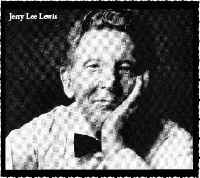
Budweiser Stage
7:30 p.m.
Way back in 1957, this twice-married, once-jailed, 21-year-old Bible-college dropout from Ferriday, Louisiana, was determined to become Sam Phillips’ next discovery. His first single, the pumping piano tune “Crazy Arms,” did moderately well. Then all hell broke loose when Jerry Lee Lewis cut “Whole Lotta Shakin’ Goin’ On” at Memphis’ Sun Studio. Onstage, the Killer fulfilled every parent’s worst nightmare, delivering a solid mule kick to his piano bench and shaking his hips in a frenzy. Lewis reinvented himself as a straight country star in later decades, but a slow-building rock-and-roll comeback (which began with the late-’80s big-screen biopic Great Balls of Fire and includes his induction into the Rock and Roll Hall of Fame) has rightfully restored Lewis to his position at the forefront of rock royalty. In concert and on his latest album, last year’s Last Man Standing, you can still hear the insolence: Elvis might’ve started the revolution, but Jerry Lee Lewis confirmed it: Rock-and-roll is here to stay.
Gov’t Mule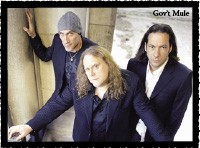
Budweiser Stage
9 p.m.
With onetime Allman Brothers Band alumnus Warren Haynes at the helm, this musical apple hasn’t fallen too far from the tree. Since the mid-’90s, Gov’t Mule has purveyed its Southern-tinged down-and-dirty musical style into a touring machine that attracts jam-band fans and hardcore rockers alike. Originally a power trio, the band nearly derailed after the death of founding member Allen Woody in 2000. Now a quartet, Gov’t Mule is bigger and stronger than ever: Their latest album, High & Mighty, is a rollicking road trip that touches on reggae (“Unring the Bell”), African pop (“So Weak, So Strong”), and New Orleans funk (“3 String George”). Live, expect plenty of extended jams, à la the nine-minute “Endless Parade,” a free-form classic-rock extravaganza that, along with “3 String George,” closes out High & Mighty.
The Allman Brothers Band

Budweiser Stage
10:55 p.m.
Hailed by the Rock and Roll Hall of Fame as “the principal architects of Southern rock,” the Allman Brothers Band has persevered for nearly 40 years, overcoming hardships, handicaps, and tragedy that would fell many other groups. Founded by brothers Gregg and Duane Allman in Macon, Georgia, in 1969, they proved to be the South’s original jam band, following the Grateful Dead’s lead in combining blues, country, R&B, and jazz influences into a heady, often drug-fueled rock-and-roll party. Despite the deaths of Duane Allman and bassist/co-founder Berry Oakley in the early ’70s, the remaining members of the group soldiered on, recording classic albums such as Eat a Peach and Brothers and Sisters and inspiring Southern rockers such as Lynyrd Skynyrd and Blackfoot in their wake. Led today by organist Gregg Allman, the Allman Brothers Band continues to boogie, aided by original members such as drummer Butch Trucks and percussionist Jai Johanny “Jaimoe” Johanson, bassist Oteil Burbridge, and second-generation Brother guitarist Derek Trucks.
North Mississippi Allstars
AutoZone Stage
6 p.m.
Favorites on the jam-band and Southern-rock scenes, the North Mississippi Allstars — anchored by brothers Luther and Cody Dickinson (who play guitar and drums, respectively) and bassist Chris Chew — might live across the state line, but in Memphis, they’re hailed as hometown heroes. Influenced by regional talent such as R.L. Burnside, Junior Kimbrough, and Otha Turner — the holy trinity of hill-country bluesmen — the Allstars spend approximately 300 days a year on the road, spreading the north Mississippi blues sound far and wide. On their last album, 2005’s Electric Blue Watermelon, and in their contributions to the score of Black Snake Moan, you’ll hear the Allstars take those roots-based influences to an even higher level, fusing folksy tradition with contemporary rock.
Chevelle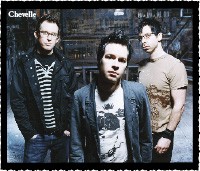
AutoZone Stage
8 p.m.
Although this Chicago-based power trio honed their craft amidst headbangers on the Ozzfest circuit, Chevelle’s sound focuses more on the tightrope between sound and silence than bona fide heavy metal. Contrasting thumping guitar riffs and melodic vocals, frontman Pete Loeffler harnesses pure energy for his inspiration. Anchored by his younger brothers Sam (drums) and Joe (bass), Loeffler truly comes unhinged on hit singles such as “The Red” and “Send the Pain Below,” both from the band’s 2002 Epic debut, Wonder What’s Next. While their next studio album, 2004’s This Type of Thinking (Could Do Us In), brought inevitable Tool and Korn comparisons, the brothers Loeffler prove their individuality with tracks such as “Panic Prone” and “Vitamin R (Leading Us Along).” The band’s newest album, Vena Sera, which was released last month, features a lineup change (with brother-in-law Dean Benardini replacing Joe Loeffler on bass), heavy, headbanging riffs (check out “Brainiac” or “Midnight to Midnight”), and, on songs like “Well Enough Alone” and “Humanoid,” plenty of emo-oriented lyrics.
Social Distortion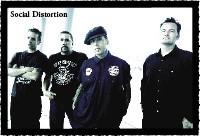
AutoZone Stage
9:40 p.m.
Led by Mike Ness, Social Distortion made a big splash in Southern California’s early-’80s punk-rock scene with songs such as “Mommy’s Little Monster” and “Another State of Mind.” A decade later, the group rebounded with Los Angeles’ retro-vibed rockabilly enthusiasts when it released original tunes such as the rangy-and-twangy “Ball & Chain” and a well-suited cover of Johnny Cash’s “Ring of Fire.” Today, Social Distortion is an accepted member of the pop-music mainstream — body-covering tattoos, black eyeliner, and all. They’re an edgy, roots-influenced rock band in the vein of the Rolling Stones, still going strong with songs such as “Reach for the Sky,” “Don’t Take Me for Granted,” and “Nickels and Dimes,” all from their last studio album, 2004’s Sex, Love and Rock ‘n’ Roll.
Three 6 Mafia
AutoZone Stage
11:20 p.m.
There’s a reason why Three 6 Mafia are the most revered — and the most hated — group from the Dirty South. Triple 6 has had North Memphis on lockdown for the last decade, while at the 2006 Academy Awards, they proved unbeatable as well, instantly catapulting from Most Known Unknowns to the most famous rap group in the world. This weekend, reality TV’s newest stars will make the journey from “Hollyhood” to their home turf, turning up the volume on crowd pleasers such “Tear Da Club Up,” “Stay Fly,” and “Poppin’ My Collar” as well as an encore presentation of their Oscar-winning “It’s Hard Out Here for a Pimp.”
Popa Chubby
TN Lottery Blues Tent
6 p.m.
It might be time for Bronx-born Ted Horowitz to change his name permanently: With more than a dozen searing guitar-based blues albums to his credit as Popa Chubby, the young musician has certainly established himself as a favorite on the club scene. With his 2002 breakthrough, The Good the Bad and the Chubby, he matured into a strong, postmodern player, whose work — all original tunes — ranges from the hard-rockin’ (“If the Diesel Don’t Get You Then the Jet Fuel Will”) to sultry Southern soul (“I Can’t See the Light of Day”) and beyond. His latest effort, Stealing the Devil’s Guitar, shows that he’s also a student of the north Mississippi blues scene, weighing in with a spirited cover of the late Jessie Mae Hemphill’s “In This World.” On his studio recordings, Popa Chubby’s insightful lyrics are darkly humorous; delivered onstage in his trademark growl, songs such as “Smuggler’s Blues” and “Preacher Man” are sure to draw comparisons to Tom Waits’ bluesy oeuvre.
Hubert Sumlin & 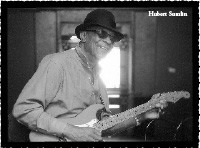
Willie “Big Eyes” Smith
TN Lottery Blues Tent
7:30 p.m.
Greenwood, Mississippi-born Hubert Sumlin got his start on KWEM radio in West Memphis, playing with Pat Hare and James Cotton back in the 1950s. Howlin’ Wolf took Sumlin north to Chicago, and blues guitar hasn’t been the same since. Sumlin’s unpredictable twisting riffs and solos — check out “Killing Floor,” “Mr. Airplane Man,” and “Wang Dang Doodle,” for starters — led him to be crowned the King of the Outer Space Guitar. Now in his 70s, Sumlin never ceases to astonish and amaze. Don’t miss this performance, which will be anchored by legendary drummer Willie “Big Eyes” Smith.
Richard Johnston
TN Lottery Blues Tent
8:55 p.m.
In recent years, Johnston, a late-blooming street performer, has become one of the rising stars on the independent blues scene, winning the 2001 International Blues Challenge and releasing a best-selling debut album, Foot Hill Stomp, dedicated to — and inspired by — the late north Mississippi hill-country blueswoman Jessie Mae Hemphill, who joined Johnston onstage at the Beale Street Music Festival last year. Solo, Johnston is sure to wow audiences with his world-weary howl and his picking ability on the cigar box LoweBow, a one-stringed cousin of the electric guitar.
Koko Taylor

TN Lottery Blues Tent
11 p.m.
The Memphis-born sharecropper’s daughter who became the Queen of Chicago blues, “Miss ‘Wang Dang Doodle'” herself, Koko Taylor is undoubtedly the last of the brassy-voiced blues shouters. One of the perennial performers on the blues festival circuit — and the holder of more Blues Music Awards than any other female blues singer in history — Taylor got her start at the legendary Chess recording studio before cutting 10 albums for Alligator Records. Nearly sidelined after a devastating van wreck while on tour two decades ago, she nevertheless rebounded, recording hit albums such as 1990’s Jump for Joy and Royal Blue (which featured B.B. King, Keb’ Mo’, and Kenny Wayne Shepherd) a decade later. Taylor’s latest, Old School, which was released last month, features five new originals as well as cover tunes penned by fellow Chicago blues-scene veterans such as the late Willie Dixon and Magic Sam.












